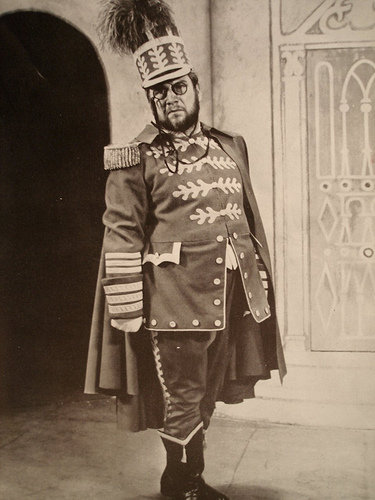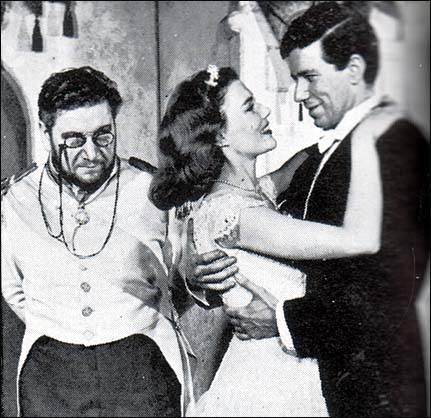Peter Ustinov was a British citizen of Russian, French, German, Italian, and Spanish extraction, then resident of America who distinguished himself as an actor, playwright, director, linguist, monologuist, cartoonist and mimic. He once said, “I suppose that if Leonardo da Vinci were alive today he would be told by the art critics, ‘Stop messing about with trying to fly and designing siege cannons; stick to your drawing.’ ”
At one time, in the arly 1960’s , he was the most versatile personality in the theater. By 1960, he had written thirteen plays, of which the two most successful, The Love of Four Colonels and Romanoff and Juliet, went on to Broadway production. The first starred Rex Harrison, while the second starred Ustinov himself as the befuddled, bearded, bamboozling Prime Minister. Movie audiences saw him in three major roles, most notably that of the cold, malevolent Emperor Nero in Quo Vadis. To the television public he was familiar as a mimic and wit on many shows.

As the general in Romanoff and Juliet. 1957—Image:http://www.flickriver.com/photos/67827566@N00/tags/broadway/
One of a rare species, he invited comparison with the few other examples of theatical versatility ( “An Orson Welles under control”; “a Noel Coward who never learned to comb his hair”). Like them, in an age of specialization he encountered a widespread prejudice that a man of many talents must also be a man of lesser talents.
Since 1942, when his first play, House of Regrets, was produced in London, Ustinov was cursed with the critical tag “promising.” Since then, he built a career on successes and failures. British reviewers argued, and with some justice, that he won his battles but lost his wars. He was inclined to be rated as a boy wonder emeritus.
It remained for Ustinov’s invasion of America in Romanoff and Juliet in 1957 to establish him as a household word and an unqualified success. Oddly enough, Ustinov’s superbly funny performance in his play was not enough to accomplish the trick. When the play began to lurch and sag at the box office, Ustinov singlehandedly turned it into a hit, simply by making one appearance after another on television. Said the critic John Mason Brown at the time: “Ustinov turned to a supposed enemy and converted it into a friend. He made the new medium serve his purposes. He took the plasma of TV and pumped it into the theater. He used mass communication as a means of achieving the special communication of the theater- as if he had made the ocean run upstream, into rivers.”

— “Comedy is simply a funny way of being serious,” he once said.
He won an Oscar for his performance as a cowardly Roman slave trader in “Spartacus.” He injected a needed bit of levity into that heavy epic, and it was a measure of his inate wit that many of his lines were improvised, including a moment in which he corrected the angle of a slave-held umbrella meant to shade him, with a comment about how hard it was to find good help.
He also won an Oscar for 1964’s “Topkapi.” —Read More:http://www.playbill.com/news/article/85227-British-Stage-and-Film-Star-Peter-Ustinov-Is-Dead-at-82
ADDENDUM:
(see link at end)…So joyous and immense were the hopes that once rested on the actor, raconteur and humanitarian Sir Peter Ustinov, who has died in Switzerland aged 82, that the final balance-sheet of his life was bound to seem an anticlimax, both to himself and to those who saw the skyrocket of his early talent.
To his contemporary Richard Attenborough, and to many others, “There was no doubt that he was the genius of our generation. We regarded his potential to be as great as Chekhov or Shaw.” But, Attenborough added when Ustinov was nearly 70, “he hasn’t yet written what he is capable of – largely due to his diversity of talent”.
He never did, and he knew it. He had to be content with the immense joy that he did give, apparently effortlessly; with being the most consistently funny raconteur of his time, recognised as a peer by virtually all other humorists, such as Frank Muir (obitua
January 3 1998), who called him “one of the best-loved people in the world”.From his late teens until old age, with a steadily wider audience, he enriched the gaiety of nations and added to the public stock of harmless pleasure. His global public will be, as Dr Johnson said of David Garrick, “disappointed by that stroke of death” which eclipses his gaiety.
His mother was convinced he would be a great creative genius. By the standards he set himself, those of the old European high culture of his mixed ancestry, he fell depressingly short. His genius turned out to be mainly for life-enhancement. Read More:http://www.guardian.co.uk/media/2004/mar/30/broadcasting.artsobituaries





 COMMENTS
COMMENTS